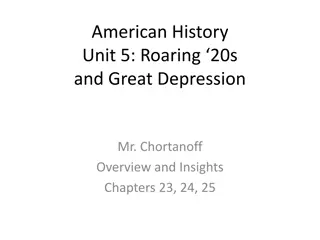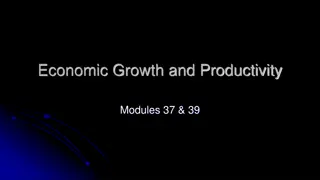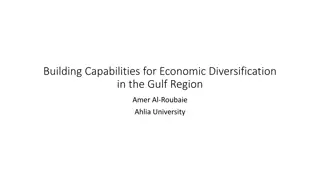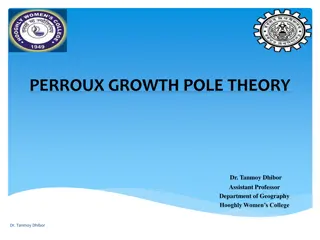Economic Growth and Consumerism: An Evaluation
Economic growth plays a pivotal role in consumerist societies, driving progress and prosperity. However, the impact on morality, spirituality, and societal well-being raises critical questions regarding sustainability and ethical implications. Explore the dynamics between economic growth and consumerism within the context of cultural interpretation and evaluation.
Download Presentation

Please find below an Image/Link to download the presentation.
The content on the website is provided AS IS for your information and personal use only. It may not be sold, licensed, or shared on other websites without obtaining consent from the author.If you encounter any issues during the download, it is possible that the publisher has removed the file from their server.
You are allowed to download the files provided on this website for personal or commercial use, subject to the condition that they are used lawfully. All files are the property of their respective owners.
The content on the website is provided AS IS for your information and personal use only. It may not be sold, licensed, or shared on other websites without obtaining consent from the author.
E N D
Presentation Transcript
Assessment 1 Education as the critical interpretation and evaluation of culture Patrick Gorton S9401234HS pgorton@stdominics.nsw.edu.au Melissa Ghignone S00068030 melissa.ghignone@syd.catholic.edu.au
The myth of maintaining economic growth as fundamental to our consumerist societies!
Focus Questions! - To what extent is economic growth important for our consumerist society? - What are the Catholic Church s teachings on the moral and spiritual implications of economic growth and consumerism on our society?
What is Economic Growth? Our capitalist society depends on the production and selling of goods and services. Assumingly the more that is produced and the more that is purchased means the more progress and prosperity we have in life. Economic growth is dependant on CONSUMPTION!
What is a Consumerist Society? Consumerism describes a society in which many people formulate their goals in life partly through acquiring goods that they clearly do not need for subsistence or for traditional display. They become enmeshed in the process of acquisition shopping and take some of their identity from a [possession] of new items that they buy and exhibit. (Stearns 2006:viii)http://babcicky.com/definition-of-a- consumerist-society/
To what extent is economic growth important for our consumerist society? Economic growth is important for our consumerist society. Economic growth is exponentially more important than income equality according to Forbes Magazine achieving and sustaining economic growth should be the central focus of national economic policy Economic growth has permitted that homes are better equipped, improvements and advancements in health and medicine increased life expectancy improvements in our environment and agriculture Overall the developments and improvements in our societies are due to economic growth! http://www.forbes.com/sites/peterferrara/2014/01/14/why-economic-growth-is-exponentially-more-important-than- income-inequality/ HOWEVER
To what extent is economic growth important for our consumerist society? Consumerism does not restrain itself. It attracts and caters to all sectors of society, whether you are young or old, male or female, alive or dead! Consumption is enshrined in our culture. People are conditioned into a consumerist society. Economic growth is responsible for a decline in the number of people living a meaningful life!
What does this image suggest is important in life? What has our society become?
To what extent is economic growth important for our consumerist society? Sam de Brito in his article in the Age asserts that Jesus wasn t a fan of consumerism: I can remember only one time when Jesus lost his lollies, and that was when he cleansed Herod's Temple and "drove out all who were buying and selling there. He overturned the tables of the money changers and the benches of those selling doves." Then he screamed and you know because versions of the bible capitalise this: "IT IS WRITTEN, 'MY HOUSE WILL BE CALLED A HOUSE OF PRAYER . BUT YOU ARE MAKING IT A DEN OF THIEVES!" It's safe to say Jesus wasn't a massive fan of consumerism (or bankers). http://www.theage.com.au/comment/jesus- wasnt-a-big-fan-of-consumerism-20141220- 125l1b.html
To what extent is economic growth important for our consumerist society? The organisation for Economic Co-operation and Development (OECD) aims to promote policies that will improve the economic and social well-being of people around the world. However inequality is higher in the OECD nations than it was 20 years ago. One of the main reasons to question economic growth and prosperity is the degree of fairness it extends to society. Is it possible to achieve prosperity without growth ??? http://www.ecobuddhism.org/solutions/sustainable_economy/prosperity_without_growth/
What does Scripture tell us about Economic Growth and Consumerism in Society? The Parable of the Rich Fool:https://www.biblegateway.com/passage search=Luke+12:13-21 Focus Questions: - What does the parable tell us about wealth and consumerism in our society? - How can the message of this parable relate to our own life in a consumerist society?
Catholic Church Teachings on the Free Market and Economic Growth for our Society 347. The free market is an institution of social importance because of its capacity to guarantee effective results in the production of goods and services.. There are good reasons to hold that, in many circumstances, the free market is the most efficient instrument for utilizing resources and effectively responding to needs .[726] COMPENDIUM OF THE SOCIAL DOCTRINE OF THE CHURCH TO HIS HOLINESS POPE JOHN PAUL II (2006)
Catholic Church Teachings Implications of Economic Growth and Consumerism for Society "A given culture reveals its overall understanding of life through the choices it makes in production and consumption. It is here that the phenomenon of consumerism arises."(CA, 36) 360. The phenomenon of consumerism maintains a persistent orientation towards having rather than being . This confuses the criteria for correctly distinguishing new and higher forms of satisfying human needs from artificial new needs which hinder the formation of a mature personality .[746] COMPENDIUM OF THE SOCIAL DOCTRINE OF THE CHURCH TO HIS HOLINESS POPE JOHN PAUL II (2006)
Catholic Church Teachings Further Implications of Economic Growth and Consumerism on Society The culture of prosperity deadens us . Almost without being aware of it, we end up being incapable of feeling compassion at the outcry of the poor, weeping for other people s pain, and feeling a need to help them, as though all this were someone else s responsibility and not our own. (Pope Francis, Apostolic Exhortation Evangelii Gaudium, 24 November 2013, 54) http://static.squarespace.com/static/51784bc4e4b0cd137cf03ca6/51a3028ce4b0643b1ca6d39d/51a6ea9be4b01ba7ba18cef4/1369893532282/officer1.jpg
What are the Catholic Church Teachings to help address the issues that derive from Economic growth and Consumerism in our society? 376. Faced with the rapid advancement of technological and economic progress, and with the equally rapid transformation of the processes of production and consumption, the Magisterium senses the need to propose a great deal of educational and cultural formation, Of itself, an economic system does not possess criteria for correctly distinguishing new and higher forms of satisfying human needs from artificial new needs which hinder the formation of a mature personality. Thus a great deal of educational and cultural work is urgently needed, including the education of consumers in the responsible use of their power of choice, the formation of a strong sense of responsibility among producers and among people in the mass media in particular, as well as the necessary intervention by public authorities .[772] COMPENDIUM OF THE SOCIAL DOCTRINE OF THE CHURCH TO HIS HOLINESS POPE JOHN PAUL II (2006)
We need to be critical interpreters of the culture and always question our lifestyle patterns!
Reflection: How important is economic growth in our consumerist society???























